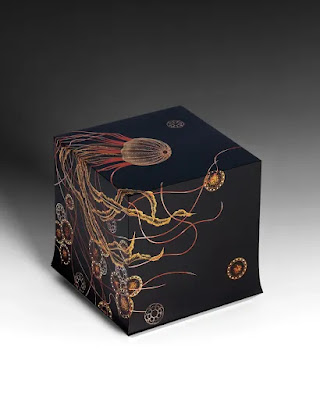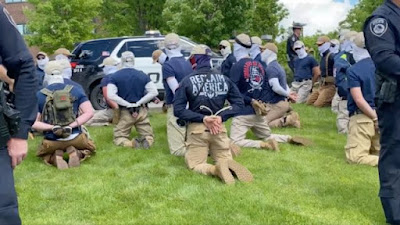Today's News . . . Today's Poem
The New Verse News
presents politically progressive poetry on current events and topical issues.
Thursday, June 30, 2022
ESTRANGED: LINES OF AN AMERICAN EXPAT
SCREE
Wednesday, June 29, 2022
THE FARRIER OF TIME
 |
| “Death blue butterfly” by mirrurin at Deviant Art |
TWO DECADES BEFORE IT WAS LEGAL
TO EMBODY THE BREEZE
 |
| Samuel Alito; drawing by David Levine |
ON CASSIDY’S COATTAILS
You have affirmed my faith Cassidy Hutchinson
in telling the truth, in speaking it openly before
the camera, in real time, before Congress, before
history and its judgments, before the criminal
watching from his Mar a Lago mansion, before
my children, before all people interested
in seeing the line that cannot and will not
be crossed no matter how many tantrums,
and lunges for the clavicle, and requests
to overturn an election fairly won come down
from the boss, the besotted and dangerous fool
who took control of the powers of state and sought
to make them serve himself first, his acolytes second,
and damn the people, his charge. Damn even
the deranged, armed with rifles, handguns,
spears and flagpoles and bear spray who marched
to stop certification of the US election. Amazing
that we saw this defacement, as Cassidy said,
of our Capitol. Amazing that we got through
that plunder, and are still living and loving
and moving about our United States. We were
driven to the brink. And the violation of
women’s rights called Dobbs, and the approval
to carry guns in public, and I don’t know what
else, will come out of that radicalized building
on 1st Street NE, but let me speak for the not
silent majority. No more. We will not allow
Januuary 6th to happen again. Not in one day.
Not incrementally with elimination of
our human rights. There is a new day
in America charged, recharged, driven
by ethics, faith in the republic, in
undeniable rights. Morning again
I call it, for the mother and father
of all marches, in America. Not
on the Capitol, but in the conscience
of all our people. for truth, for justice,
for liberty. for the American way
not the highway, not the forked
road, not the Kool aid served
by the deluded prophet in a MAGA hat.
Indran Amirthanayagam's newest book is Ten Thousand Steps Against the Tyrant (BroadstoneBooks). Recently published is Blue Window (Ventana Azul), translated by Jennifer Rathbun.(Dialogos Books). In 2020, Indran produced a “world" record by publishing three new poetry books written in three languages: The Migrant States (Hanging Loose Press, New York), Sur l'île nostalgique (L’Harmattan, Paris) and Lírica a tiempo (Mesa Redonda, Lima). He writes in English, Spanish, French, Portuguese, Haitian Creole and has twenty poetry books as well as a music album Rankont Dout. He edits The Beltway Poetry Quarterly and helps curate Ablucionistas. He won the Paterson Prize and received fellowships from The Foundation for the Contemporary Arts, New York Foundation for the Arts, US/Mexico Fund For Culture, and the MacDowell Colony. He hosts the Poetry Channel on YouTube and publishes poetry books with Sara Cahill Marron at Beltway Editions.
Tuesday, June 28, 2022
THE CONSTITUTION AND A SPRIG OF RUE
TODAY I PLANTED
BURNING
Monday, June 27, 2022
A PIVOT
SITTING ON A TOILET :: ALONE WITH A BED OF ROSES
Sunday, June 26, 2022
IF THIS WERE A SAM ALITO POEM
by Dick Westheimer
Learn to predict a fire with unerring precision.
Then burn down the house to fulfill the prediction.
If this were a Sam Alito poem, it would be written in tidy couplets, matched in beat and time. It would forget that words are born from grunts and battle cries, that swords decide which terms can be used and which are taboo, that the right to cleave your neighbor with a steel blade is her duty to bear Samuel’s baby, the one he so loves, the one that he is willing to render in tersets and turds, to bang and clang the lines into refrigerator magnets with the only words being “life” and “thoughts” and “and” and “prayers.”
If this were an Amy Coney Barrett poem, The First Word In Each Line Would Be Capitalized, the lines themselves would neatly rhyme, would chime with the rhythm of the Sainted Ones, entrain with the iambs of a military parade—with goose-stepping Aunties’ heads and staffs held high, saluting to the the crowd of Commander’s wives in their hues of blue, and to the Guardians of the Right who know a thing or two about the bump and mad grind, about how we’re all inclined to naughty deeds with the lights turned off with a glory hole chemise cagoule between a woman and the beasts with their hairy parts and the beat of steeple-hatted bigots stomping time on courthouse floorboards.
If this were a Clarence Thomas poem, the meter will be trochee, a hammer hammer hammer double time. It would be a sestina cycling lines of the before times when men were men and women were not, when guns were muskets and books were sewn with linen thread, when Coke cans shed the hair of the dog that bit us all, when what was written in the age of powdered wigs was wise and there would be a crowning of a New King who’d reign over a land where men who held hands with men were melted down into guns anointed by boys who’d hold lead to the heads of women great with child.
And if this were my poem, the verse would be blank, the words mute, the letters scattered across the page. The white space would be smudged with ash, the margins smudged with blood and pocked with powder burns. The verse would exercise its right to remain silent, cuffed to a chair, pregnant, with despair.
Dick Westheimer has—with his wife and writing companion Debbie—lived on their plot of land in rural southwest Ohio for over 40 years. His most recent poems have recently appeared or are upcoming in Rattle, Paterson Review, Chautauqua Review, RiseUp Review, Ekphrastic Review, Minyan, Gyroscope Review, and Cutthroat.
JUSTICE, CLARENCE?
Saturday, June 25, 2022
JOHNNY DEPP WINS, AND I, LIKE SO MANY OTHERS, THINK OF THE MAN WHO ABUSED ME
Friday, June 24, 2022
TODAY STARTED OUT WITH A HOPEFUL MOMENT
 |
| by Andrew Shu |
THE DAY ROE V. WADE WENT AWAY
A LOADED GUN
 |
| by C.B. |
GRANDMA'S NIGHTGOWN
U.S. SUPREME COURT PROTECTS GUNS
 |
| Illustration by Elizabeth Brockway/The Daily Beast: “Inside the Celebrity Murder Behind the Gun Law SCOTUS Just Gutted,” June 23, 2022 |
THERE'S A WORD FOR IT
Thursday, June 23, 2022
UNNATURAL DISASTER
 |
| The U.S. Forest Service failed to consider how a changing climate could make the landscape more flammable, didn’t adequately estimate the risk of a controlled fire escaping and used incomplete weather information as a prescribed burn went awry and later formed the largest wildfire in New Mexico history, the agency said in a report released Tuesday. The 85-page report describes how federal fire managers, who felt under pressure to complete the prescribed burn while they had the available personnel, made miscalculations and overlooked warning signs—including low humidity, the potential for erratic winds on complex terrain and the heavy, dry fuel loads that could stoke a runaway fire. Although crews followed the burn plan, it contained flawed and incomplete analyses, and some guidelines were out of date amid a prolonged drought, the report said. The result: The prescribed burn ignited a wildfire that later merged with another prescribed burn to create the Hermits Peak/Calf Canyon Fire, scorching 341,746 acres as of Tuesday and destroying hundreds of homes in a 500-square-mile area. Santa Fe New Mexican, June 21, 2022. Photo: Hot shot crew members keep an eye on a blaze June 15 as fire crews ignite the underbrush in an effort to contain the Pipeline Fire near Flagstaff, Ariz. (Rachel Gibbons/Arizona Daily Sun/AP via The Washington Post) |
Wednesday, June 22, 2022
PICTURE PROBLEM
 |
| Video footage (via The Texas Tribune) recorded inside Robb Elementary School in Uvalde at 12:04 p.m. May 24. Authorities stormed the classroom at 12:50 p.m. |
Tuesday, June 21, 2022
TWITTER VS THE NEW VERSE NEWS — UPDATE
Monday, June 20, 2022
SEQUEL
I SMELL HER CHOKE
ON "FLICKERING" BY YOSHIO OKADA
 |
| “Flickering” Box with Sprinkled Design of Jellyfish, 2020, by Yoshio Okada |
Sunday, June 19, 2022
BIGOTS SHOWED UP TO PRIDE WEARING KHAKIS
 |
| Authorities in northern Idaho are leaving open the possibility for more criminal charges against 31 white nationalists accused of planning to riot at a weekend Pride festival. Members of a group known as Patriot Front face misdemeanor charges of conspiracy to start a riot. —NPR, June 14, 2022 |
Saturday, June 18, 2022
ASSANGED
| UK Home Secretary Priti Patel has signed an order to extradite WikiLeaks founder Julian Assange (above) to the United States, where he faces espionage charges, in a decision his organization said marked a "dark day for press freedom." —CNN, June 17, 2022 |














